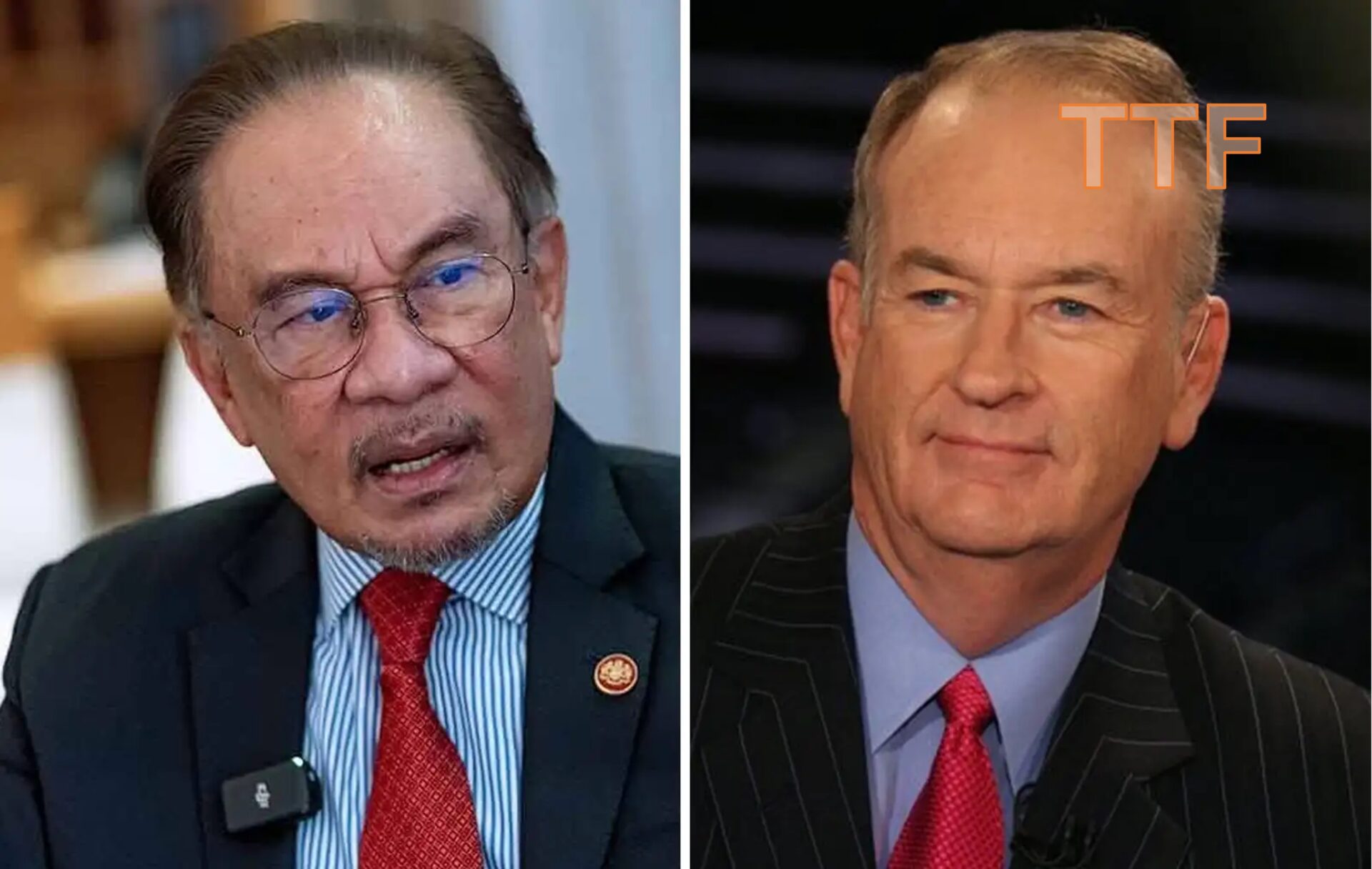
Raggie Jessy Rithaudeen

Prime Minister Datuk Seri Anwar Ibrahim has slammed American political commentator Bill O’Reilly for mocking Chinese president Xi Jinping’s official visits to Malaysia, Vietnam and Cambodia.
“That’s an extreme view marked by arrogance and ignorance, assuming that his group or country is successful,” Anwar said in response to O’Reilly’s remark that “Malays aren’t gonna buy your stuff, they don’t have any money.”
“Clearly, he has no understanding whatsoever of Asia, Asean or current developments in this region,” Anwar added.
First and foremost, I agree that it was a bit much for O’Reilly to have undermined China’s effort to strengthen trade alliances with regional partners, particularly Malaysia, whose waterways and ports are pivotal to the proliferation of China’s global trade.
The fact is, Xi’s proposal to Malaysia aligns with my expectations from an earlier livestream (Read here: https://www.thethirdforce.net/caught-in-the-crossfire…/).
Among all of Xi’s suggestions (which were mostly broad and non-specific statements), this is the key highlight:
“… turning Malaysia’s main ports into a vital hub within the New International Land-Sea Trade Corridor.”
China is determined to establish a stronger presence in the ports along the Strait of Malacca.
To achieve this, China will gradually form joint-venture companies with Malaysia—specifically, companies with strategic access to those ports.
The Strait of Malacca is a key focus for China, alongside transshipment activities with Malaysia in those waters.
China will explore every possible avenue to bypass US tariffs, including ramping up production through joint-venture companies registered with the Companies Commission of Malaysia (SSM) and using over 50% of local raw materials.
The goal is to ensure those products can be labeled as “Made in Malaysia.”
This could actually benefit Malaysia. However, we must remain cautious about China’s intentions, because any increase in transshipment activities will draw serious scrutiny from the US.
Without doubt, Washington will impose various restrictions and implement complex review processes for Malaysian exports to reduce the risk of “fraud aimed at helping China evade tariffs.”
In my view, it’s safer and more profitable for Malaysia to reduce transshipment activity and focus instead on forming joint-venture companies with China to produce Chinese goods using local raw materials—so that these goods can rightfully carry the label “Made in Malaysia.”
That said, those who watched O’Reilly’s commentary should understand that he was speaking in a broader sense, taking into consideration the dynamics of global trade that depend heavily on the US dollar and the importance of doing business with the United States.
Like it or not, China’s economy—and the expansion of its militaristic might, which remains a top priority for the Communist republic—is deeply anchored in trade with the US and the financial leverage derived from US treasury securities, to say the least.
To some observers, China’s “Belt and Road” and transport initiatives—impressive, no less, and beneficial to Southeast Asia’s economic growth—may also serve a latent militaristic purpose, particularly if a global conflict were to erupt.
The US is well aware of this, and even if China is trying to rope Malaysia into a nexus of countries aligned with the Chinese Yuan, the US will make damn sure that network would tilt overwhelmingly in favor of its dollar.
The US will accomplish this by ensuring its dominance continues through steep tariffs on China. Suffice it to say, the more China pivots to Southeast Asia without engaging the US on trade terms, the more severe the consequences—for both China and the countries that choose to align with it.
The fact that over 135 countries that rely on Chinese trade have still chosen to prioritize trade relations with the US—and are actively seeking to negotiate terms with Trump—only adds to Beijing’s frustration.
For China to rely solely on Southeast Asian countries to cushion the blow of Trump’s tariffs is wishful thinking. In reality, it isn’t even significant—so much so that it can be dismissed entirely.
The amount of ‘cushioning’ these economies can provide is akin to dropping a 10-ton concrete slab onto a regular-sized bedroom pillow—it’s as good as having no cushion at all.
That’s precisely what O’Reilly was getting at, if one understands the full scope of his commentary, which ties into his earlier analysis of Trump’s tariff strategy.
He wasn’t mocking China’s visit to Malaysia or insulting Malaysia or Malays. He was simply speaking in relativistic terms—that if China was looking for a ‘cushion’ in Southeast Asia, that cushion simply doesn’t exist.
Thus, taking O’Reilly literally on the phrase “Malays aren’t gonna buy your stuff, they don’t have any money,” is taking things out of context—and that’s my take on it.
Besides, Anwar is the Prime Minister of Malaysia, and O’Reilly is a former news anchor turned YouTuber, now freely expressing his opinions outside of mainstream media.
For a Prime Minister to give that much prominence to a YouTuber from abroad isn’t just disproportionate—it could give off vibes of insecurity that risks elevating fringe commentary into national controversy.
That said, O’Reilly said what others won’t: The cushion doesn’t exist. Only, he could have said it tactfully to avoid being misinterpreted or misrepresented.



